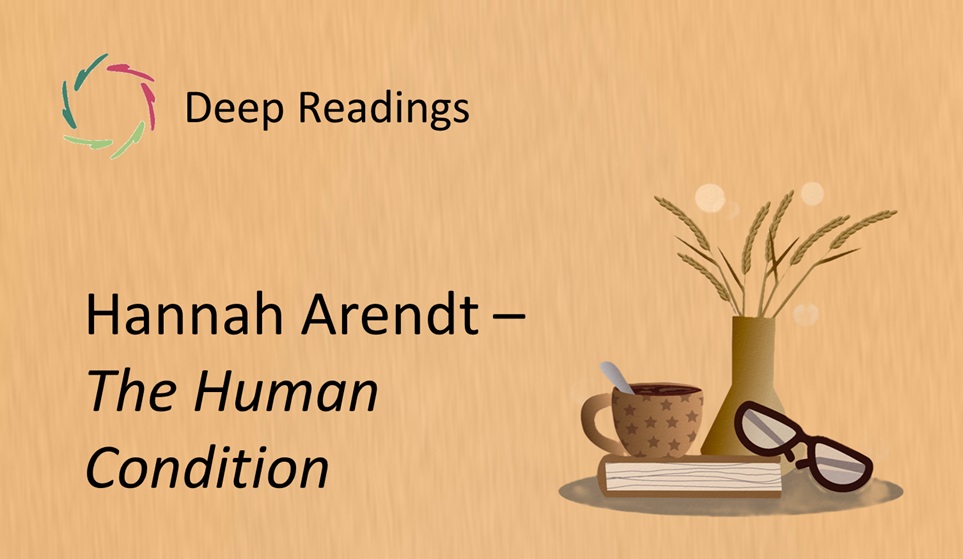Deep Readings: Hannah Arendt – The Human Condition (1958)

The Fragment
The human condition is plurality: to live as a distinct and unique being among others. Without the presence of others, no one can appear, act, or speak. We are born into a world that we share — and it is through this sharing that freedom becomes real.
(Excerpted, fair use — [Read more → see Stanford Encyclopedia of Philosophy or Internet Archive])
Contextual Glimpse
In The Human Condition, Arendt reflects on what it means to live and act in a world shaped not only by thought but by speech and presence. This passage appears early in her meditation on “action” — the capacity to begin something new. But action is never solitary: it exists only in a world of others.
When Arendt says the human condition is plurality, she does not mean simply that people are different. She means that to be human is to exist among others, each with their own uniqueness. In this, she offers a bold alternative to the ideal of the autonomous individual. Our humanness is revealed through co-presence.
Resonance
Plurality is not always comfortable. It brings tension, unpredictability, misunderstanding. Yet without plurality, there is no real freedom, because freedom is not withdrawal from others but a shared space of appearing.
This resonates today, where individualism and loneliness often pull people inward. Arendt calls us back not to conformity, but to the miracle of coexistence — where each voice, each act, reveals not only itself but reshapes the whole.
Why this may also be about you
You may sometimes feel the desire to disappear — or the wish to be fully understood without having to explain. Arendt reminds you that who you are becomes real in relation. To appear, to act, to speak — these are not solitary acts.
Maybe your own freedom begins not in separation, but in shared visibility. Even silence, among others, is a form of being seen.
Lisa’s inspired, original idea about this fragment
This plurality may also reflect something within. You are not one fixed “I,” but a living plural — memory, voice, shadow, longing. To appear among others is to bring this inner community into dialogue with the world.
Arendt’s vision suggests that the self is not a fortress, but a window. And perhaps true strength lies not in holding firm, but in becoming visible — fragile and luminous — in a world of others who are also trying to appear.
Echoes
Arendt’s idea of plurality echoes in movements for democracy, education, and shared public life. But it also lives in poetry, friendship, and art — wherever people come together and allow one another to be seen.
Her thought resists both tyranny and despair. In totalitarianism, plurality is erased. In isolation, it is forgotten. But in every true conversation, every shared beginning, Arendt’s plurality is reborn.
Inner Invitation
Sit with this: Where do I allow others to see me — not perform me, but truly see? Where do I witness others in their singularity?
Let your breath meet this question. Let the answer arrive not as explanation, but as a small act — a word you might say today that helps another person appear more fully.
Closing Note
To be human is not to stand alone, but to appear among others — as one light among many, in the shared field of freedom.
Lisa’s final take
Plurality is the birthplace of freedom.
Keywords
plurality, human condition, Arendt, visibility, public life, freedom, shared world, co‑presence, uniqueness, mutual revelation


